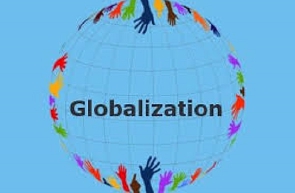An English Poet, Alfred Lord Tennyson’s quotes, “the old order changeth yielding place to new”, amply validate the emergence of the globalization phenomenon, which has erupted with a big bang. IMPACT OF GLOBALIZATION Indeed, globalization could be elucidated as a process by which socio, politico-economic paradigms act in tandem with modern technological advancement to bring people living in different geographical locations closer, so that they can integrate and do things in commonality in a borderless world cannot be over-emphasized. Conspicuously, the degree of intensity of globalization, its associated rapidity, volume, and geographic reach in the scheme of global activities continue to shape overall events in contemporary times. It is significant to note that, the phenomenon has affected the world in diverse ways in tandem with modern computerization. In the economic sphere, the free exchange of goods and services has created a grandiose global market resulting in greater wealth for investment, massive development, and substantial reduction of the world’s poverty, more specifically, in the global southern hemisphere where two-thirds (2/3) of the world’s vulnerable populace are naturally located In tangible terms, it has offered the opportunity for high volumes of money to be transferred or repatriated from one geographical location to the other instantaneously, by a mere click of a button, without recourse to conventional banking practices and associated laborious procedures. One perceptible benefit of globalization is the unforeseen impact of the growing flow of remittances from migrants abroad to families in their home countries. These remittances improve substantially the economies of the beneficiary countries and consequently create new financial pathways and fashion out new socio-economic paradigms to bring about better-quality living standards; thus, contributing to lifting an entire populace out of abject poverty. COMMUNICATION Certainly, the Internet, Fax machines, and satellite networks have swept away old national cultural boundaries. Without a shred of doubt, the Internet, mobile phones, and Satellite networks have consequently shrunk space and time. Technological advancement has considerably increased and enhanced the rate of speed of both local and international communication; this has therefore drastically reduced the hitherto high cost of communication, holistically. In hindsight, a very classical example could be recalled where in the 1930s, a one-minute telephone call from London to New York could cost as much as approximately USD 200. Today, the full utilization of E-mail via the internet, or even using fax devices or social media using WhatsApp, Twitter, or Instagram to transmit corresponding messages to the same geographical location is almost costless; besides, this is accomplished with considerable rapidity. In the realm of Globalization, Globalized technology has led to the scientific discovery of Submarine fiber optic cables; a very high-profile telecommunication technology that could guarantee uninterrupted information flow with greater extensity, intensity, and velocity. Consequently, with innovation being deployed in the use of Biometric technology, individuals who engage in cross-border criminalities like drug lords, seasoned money launderers, etc. are easily accosted and subsequently brought to justice, through biometric (fingerprint) surveillance. Such unanimously acknowledged technological breakthrough heightens the effectiveness and competencies of issuance of travelling Visas by issuing agencies and Immigration control authorities. Incontrovertibly, Globalization has seen the possibility of accessing programmes and services including one’s favourite games play on Television, such as watching the UEFA championship league or the taxonomy of programs beamed by CNN or ALJAZEERA. The recent upsurge of universally acclaimed fictional games like Nintendo’s, Play Station, TX, Nintendo X-BOX, etc. has provided indoor amusement exclusively and tremendously, whipped up much enthusiasm. This has therefore contributed to improving users' intellectual capabilities, more specifically, the youth of today. EDUCATION It is undeniable fact that globalization has brought about intense education and enlightenment. The invention and effective utilization of Cellular handsets has spurred on many stark illiterates to learn to identify and compute figures and alpha numerals for messaging purposes. Besides, this has boosted the probability of accessing one’s E-mail and various programs in the comfort of one’s home, vehicle, office, in a Lift, air-borne, or any conducive environment instead of exploiting public Internet facility for such services where the ambiance and individuals’ safety could be compromised. Conspicuously, a core element that has recently emerged in the contemporary globalized system, seen as an indisputable offshoot is the institutionalization of decentralized university faculty and campuses of most principal institutions of higher learning scattered around the Globe. This development has reasonably enriched accessibility for prospective students and optimally enhanced the student intake ratio from a global perspective. CLASH OF CIVILIZATION It must be acknowledged that Globalization has deepened the conception of the “Clash of Civilizations”. Samuel P. Huntington conjectured that, in geographical locations within the universe where two or more civilizations meet, clashes are likely to occur. These unintended clashes are often provoked by differences in cultural values, and religious inclination juxtaposed with deep-rooted traditions. Subsequently, clashes may involve organized clans, ethnic groupings, or to an extent involvement of nation-states. Such a state of affairs, unequivocally, poses greater risk and challenge to mortals’ existence on earth. Globalization is supposed to fuel and guarantee social, Political, and economic unification. However, countries within the Northern Hemisphere tend to exploit to empower their already strong and wealthy economies to the detriment of nations within the Southern Hemisphere where poverty is exceedingly endemic. Economically, countries such as China, India, Malaysia, Brazil, Mexico, South Korea, Thailand, and, etc. now no longer export only raw materials but also finished and semi-finished products and services. In India for example, IT exports alone account for nearly 40 percent of export earnings. The phenomenon has unearthed systems ensuring substantial exportation of both natural raw materials and value-added products from countries within the southern hemisphere to the industrialized nations. This has therefore seen a substantial escalation in world trade and has contributed to a seeming reduction of trade barriers such as import tariffs, trade restrictions, currency convertibility, and a host of others. A very laudable feature that has come on the heels of globalization is the establishment of Continental Free Trade Areas (CFTA), Export processing zones, (EPZs), or Free zone enclaves, (FFZEs in countries with less income per capita and Africa’s Growth and Opportunities Act, (AGOA). Fast-consumable finished products like textiles, footwear, etc. are processed and exceptionally packaged for, specifically, the US/EU markets. The exports support economic growth and a foreign exchange earner to developing countries and additionally, guarantee job creation and employment opportunities which includes tax injections; this eventually truncates poverty levels in these polities, thereby, raising the living standard of the people. The fascinating effect of globalization is that individuals can reside, live and work or transact business in any part of the planet without many obstacles. Globalization leads to better cultural understanding and tolerance. It has improved traveling prospects; therefore, more and more people travel to different Countries, thereby spreading their culture, traditions, and lingua franca to other parts of the world. GLOCALIZATION The profile of KFC, Burger King, McDonald’s business conglomerate, and lately Chinese restaurants within the food chain scattered around the globe, clearly illustrates the complexity of glocalization, an offshoot of Globalization. McDonald,s a once negligible local American food enterprise has escalated into a far-reaching transnational corporation, with a glowing universal trademark. With its restaurants and cafeterias almost established in every corner of the universe, it has succeeded in adapting to domesticate its food business based on tastes and local preferences in consonance with the tradition, customs, and culture of the people whilst still maintaining the originality of its food product. This has ultimately shaped both national cultures and unstructured world cultures. It has invariably caused the creation of what is better known today as GLOCALIZATION. NEGATIVE EFFECT OF GLOBALIZATION Experts believe that globalization is increasing the risk of the spread of new diseases; e.g. EBOLA, MONKEY POX, COVID-19, HIV-AIDS, Tuberculosis, etc. Another unfortunate upshot of globalization has been the spread of diseases throughout the Globe that are causing enormous ecological destruction to the environment. Through the importation of Agricultural produce and products from one geographical location to another, parasitic weeds and gregarious insects found their way to new environments. Over time, it goes through propagation and ends up causing considerable devastation to water bodies, lands, and crops. ILLICIT TRADE The spread of global terrorism, the growing trafficking of women and children for engagement in prostitution, i.e. Human trafficking, child soldiers being forcibly trafficked into foreign lands to fight for warlords, and illegal transportation of sophisticated weapons and small arms are some of the countless global challenges and the legacy of globalization. The 9/11 devastation of the World Trade Center in New York in 2001 was, regrettably, successfully executed with precision due to the full utilization of Internet connectivity and accessibility by the Al Qaeda terrorist organization. This is amply reverberated by the growing electronic network that has created a new global order known as virtuality. Claude Moisy (1997) defines this as “the ability to create a fictitious world using one’s computers. He concluded that in such a world, one could conceal one’s identity, which threatens to make the activities of international organized crime and terrorist groups easier as illustrated by the global terrorist network Al Qaeda’s use of computers to coordinate the destruction of the World Trade Center towers in New York on September 11, 2001. Al Qaeda’s case is not an isolated one. There are countless such terrorist organizations scattered around the globe that hid behind the Internet to perpetrate turmoil unto humanity. While globalization has generated great wealth and welfare for some, many perceive it as a source of persistent inequality and social exclusion. OTHER NEGATIVE FACTORS The advent of Globalization has given way to the erosion of cultural identity and citizenship. With full utilization of Internet connectivity, it has brought about the evolving trend of severe cyber-crime suffused with Spiritism. This trend has, invariably, critically eroded business confidence and affected international trade holistically. The likelihood of economic disruptions in one nation adversely affecting other nations cannot be disputed. CONCLUSION From the foregoing, it could be inferred that the global village is not likely to be an equally sociable home for everyone. Everyone and everything is increasingly vulnerable to events everywhere. Whereas globalization has narrowed the distance between the world’s populace, some have benefited and others have lost woefully. The emergence of globalization has caused a reduction of states’ capacity to exercise political power over the territory in which private sector and non-state actors operate. This loss of control probably means that globalization has reduced the state’s monopoly over internal sovereignty, which, hitherto was exclusively controlled. In conclusion, the entire global hemisphere, no doubt, is indisputably tied to the ‘apron-string’ of globalization. The CYBER society has surfaced with a great bang. The computer culture is fast spreading with enormous rapidity, like the ‘conflagration of fire’, with all the extensity for consummation. However, there is an urgent need for policies around the globe to rally together irrespective of diverse ideological inclinations, doctrines, traditions, cultural backgrounds, and differences in lingua franca to take advantage of the positive impact of what globalization has come to offer humanity to make the universe a comfortable place to live in.
Opinions of Wednesday, 12 October 2022
Columnist: Joe Effah-Nkyi















